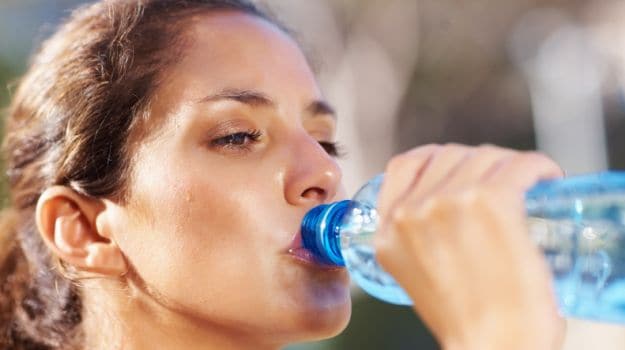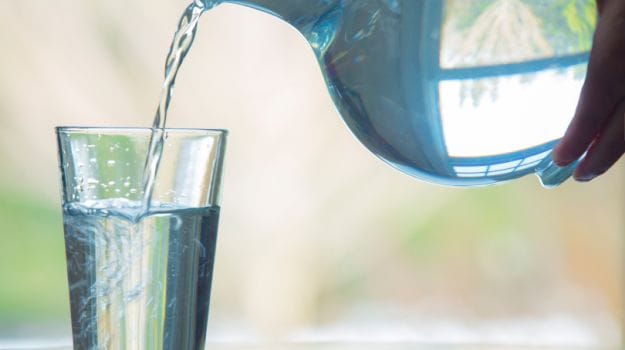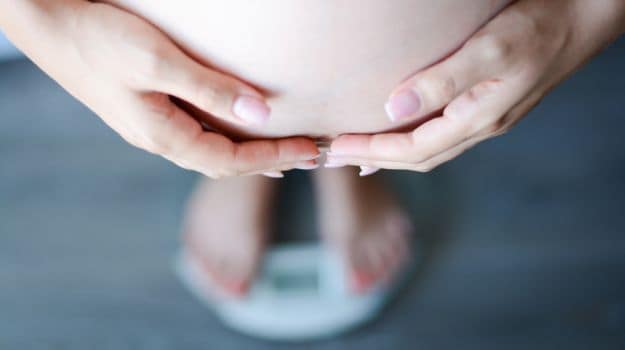Women need to drink more water during pregnancy as it aids in the baby's growth and development, and also relieves the mother from common pregnancy ailments like excess heat, nausea, heartburn, cramps, indigestion, headache, dizziness, fatigue, joint pain, and constipation. It is a known fact that up to 45-60% of body weight of an adult female is made up of water. In addition to this, during pregnancy the body requires 6-8 litres of water to maintain the health of the foetus and the new mom. Water is essential for fetal growth and developmentOn an average, women gain about 12 kgs during pregnancy and most of the weight gain is due to water. This additional water is found in the foetus(29%), placenta (6%), amniotic fluid (10%), blood (19%), uterus and breasts (14%), fat (8%) and extracellular fluid (14%). Amniotic fluid is a straw-coloured fluid that surrounds the foetus. Adequate water intake is a must to maintain the volume of this fluid. The Amniotic Fluid Volume (AFI) is a predictor of fetal well-being and it determines the perinatal outcome. It protects the baby from any mechanical trauma, prevents umbilical cord compression and acts like a shock absorber.
Hydration promotes breastfeeding During the lactation period (post-delivery), the water requirement further increases to meet the demands of breast milk production and excessive sweating. Women need to drink an additional 700 ml of water during lactation (3.5 to 4 litres/day) to maintain overall health. Breast milk contains about 87% water which makes it an essential requirement.

Risks of not drinking enough water during pregnancyDuring pregnancy, the maternal blood volume increases by 30% and plasma volume shoots up by 40% in order to maintain adequate perfusion to the placenta and other maternal organs. Dehydration may increase the risk of clot formation and preterm labour by triggering uterine contractions. Dehydration in post-delivery period can cause Cortico Venous Thrombosis (CVT) and it even increases the risk of stroke.Urinary tract infection is quite common during pregnancy. It occurs due to certain physiological changes like the growing uterus pressing on the urinary bladder which may cause urinary retention and infection. This can cause premature rupture of membranes that can eventually lead to preterm labour. Adequate water intake can flush out bacterial infection and keep your system clean. Moreover, it can been seen that most women suffer from constipation during pregnancy. This is an side-effect of the pregnancy hormone called progesterone which is produced in the body. In severe cases, regular episodes of constipation can lead to haemorrhoids (swollen inflamed veins in the rectum and anus that cause discomfort and bleeding) and fissure. Keeping yourself well hydrated along with a diet rich in fiber can help you deal with such issues.

If you do not feel quite thirsty, you can add soups, fruit juices, buttermilk or coconut water to your diet to keep your body hydrated. Hydrating vegetables and fruits like watermelons, musk melon, citrus fruits, strawberries, grapes, tomatoes, gourds, pumpkin, zucchini, green leafy vegetables can also be taken. Avoid caffeinated drinks and soda as they can precipitate dehydration.It is always safe to drink boiled and filtered water and avoid drinking water which has been stored in plastic bottles for a long time. Drinking 2-3 glasses of water stored in a copper or brass vessel for up to 8 hours has many benefits as it is known to have anti-bacterial, anti-inflammatory, and antioxidant properties. Disclaimer:
Hydration promotes breastfeeding During the lactation period (post-delivery), the water requirement further increases to meet the demands of breast milk production and excessive sweating. Women need to drink an additional 700 ml of water during lactation (3.5 to 4 litres/day) to maintain overall health. Breast milk contains about 87% water which makes it an essential requirement.

Risks of not drinking enough water during pregnancyDuring pregnancy, the maternal blood volume increases by 30% and plasma volume shoots up by 40% in order to maintain adequate perfusion to the placenta and other maternal organs. Dehydration may increase the risk of clot formation and preterm labour by triggering uterine contractions. Dehydration in post-delivery period can cause Cortico Venous Thrombosis (CVT) and it even increases the risk of stroke.Urinary tract infection is quite common during pregnancy. It occurs due to certain physiological changes like the growing uterus pressing on the urinary bladder which may cause urinary retention and infection. This can cause premature rupture of membranes that can eventually lead to preterm labour. Adequate water intake can flush out bacterial infection and keep your system clean. Moreover, it can been seen that most women suffer from constipation during pregnancy. This is an side-effect of the pregnancy hormone called progesterone which is produced in the body. In severe cases, regular episodes of constipation can lead to haemorrhoids (swollen inflamed veins in the rectum and anus that cause discomfort and bleeding) and fissure. Keeping yourself well hydrated along with a diet rich in fiber can help you deal with such issues.

If you do not feel quite thirsty, you can add soups, fruit juices, buttermilk or coconut water to your diet to keep your body hydrated. Hydrating vegetables and fruits like watermelons, musk melon, citrus fruits, strawberries, grapes, tomatoes, gourds, pumpkin, zucchini, green leafy vegetables can also be taken. Avoid caffeinated drinks and soda as they can precipitate dehydration.It is always safe to drink boiled and filtered water and avoid drinking water which has been stored in plastic bottles for a long time. Drinking 2-3 glasses of water stored in a copper or brass vessel for up to 8 hours has many benefits as it is known to have anti-bacterial, anti-inflammatory, and antioxidant properties. Disclaimer:
The opinions expressed within this article are the personal opinions of the author. NDTV is not responsible for the accuracy, completeness, suitability, or validity of any information on this article. All information is provided on an as-is basis. The information, facts or opinions appearing in the article do not reflect the views of NDTV and NDTV does not assume any responsibility or liability for the same.
Advertisement











